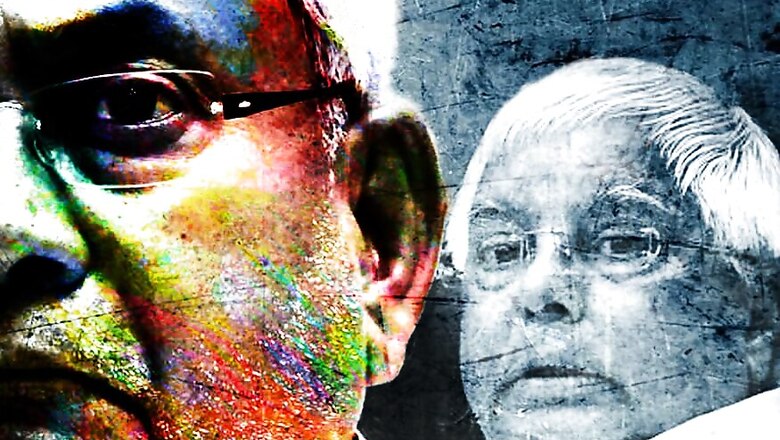
views
Patna: In a significant shift in Bihar’s political landscape, Chief Minister Nitish Kumar has rather surprisingly touched the settled beehive of ‘reservation’ and has left his alliance partner BJP in an uncomfortable position, as he tries to undo RJD’s new social formulation.
Recently, while announcing reservation in outsourced contractual jobs, Nitish even floated the idea of reserving jobs in the private sector and calling for a national debate on the matter.
Nitish Kumar’s move has visibly irked Rashtriya Janata Dal chief Lalu Prasad Yadav, who has challenged him to pass a Bill in this regard and send it to the Centre.
Janata Dal (United), in alliance with the BJP, had kept ‘Vikas’ (development) at the centre of their political narrative since 2000 when the Lalu’s RJD was in power in the state. Then the NDA won the 2005 Assembly elections on the basic premise that the RJD rule was actually ‘Jungleraj’ and Nitish, as the new chief minister, would be the harbinger of development.
Nitish had kept good governance and development at the core of his governance till 2013, when he pulled out of NDA over BJP’s choice of Narendra Modi as the prime ministerial candidate. His party fared poorly in the next Lok Sabha elections forcing him to join hands with the old foe Lalu Prasad’s RJD, which resulted in an unexpected defeat of the powerful BJP, despite the much talked about Modi wave in the 2015 Assembly election.
Nitish knows that his short-lived alliance with the RJD was successful in the elections only because of the caste combinations. The Mahagathbandhan was backed by the Muslim-Yadav (MY) combination along with an RJD constituency, which is still strongly allied with the RJD and some sections of the OBC and Extremely Backward Classes (EBC).
To add more power to this combination, a statement by RSS chief Mohan Bhagwat made it worse for the BJP just before the first phase of polling. He vouched against the continuation of reservation in perpetuity. Prime Minister Narendra Modi himself got into a damage-control mode, but to no avail and BJP was routed out of the state.
However, the same BJP is now aiding Nitish Kumar to stay in power after he dumped RJD and the Mahagathbandhan in July this year.
Surprisingly, the number of crimes in the state has gone up in recent times as the chief minister’s focus has shifted to other issues like dowry and child marriage.
At the same time, Nitish Kumar is also worried about his own political base. He must have guessed by now that development and good governance alone might not work for him again as Lalu, a master poll strategist, is trying to stitch the MY+Dalit combination along with the Congress. This was evident even when Lalu went against his partner Nitish’s decision to support the NDA Presidential candidate, Ram Nath Kovind and openly sided with Congress-backed Meira Kumar, for being a Dalit from Bihar.
Caste Identity Critical in Bihar Politics
Politically awakened voters in the state often engage in a rational political discourse. But when it comes to casting their votes, caste does a play a crucial role. As social scientist Shaibal Gupta explains, “There is no unifying state identity here like the Tamils or Malayalis have. A Bihari has either a caste identity or national identity.”
The BJP is a champion of the nationalist identity, but as Shaibal puts it, the caste identity is so strong in Bihar that nationalism might fail to have an impact here.
“Even an attempt to polarize the people won’t work here like in Uttar Pradesh. If it was to be, the 2015 results would have been different,” says Shaibal.
When it comes to the caste identity, political parties championing social justice have an upper hand in the elections and Lalu Prasad has been able to maintain an image of a grassroots leader who champions the voice of the marginalized sections. Charges of corruption and amassing benami properties, do not work against him. On the contrary, he enjoys sympathy among his supporters.
Nitish too knows that JD(U) is not a cadre-based party and its prospect largely revolves around his own persona, which has received a severe dent recently, largely due to the overnight change in his government.
However, during his term as the chief minister, between 2005 and 2013, he carved out EBC from OBC and Mahadalit from Dalit communities to help his party form a permanent vote bank. He had outdone everyone to become the first chief minister to implement a 50 percent reservation for women in Panchayati System and 35 percent reservation in government jobs. However, BJP took credit for the move as Nitish was heading an NDA government.
It is a popular belief that the JD(U) has never been able to perform well on its own. Either it required the support of BJP or RJD to win an election. Despite ten years of good governance, decimation of the JD(U) in the 2014 general election is a testimony to this fact.
Therefore, by pitching for reservation, Nitish is trying to win hearts and create a permanent vote bank and consolidate support among EBCs and Mahadalits and snatch the baton from Lalu.
JD(U) spokesperson Nikhil Mandal, grandson of BP Mandal, whose recommendations formed the Mandal Commission report, says, “Caste is a bitter truth and there is no denying the unequal social system arising out of it. Lalu Ji has indeed championed the cause of the oppressed but he used the Mandal Commission only as a political weapon and sloganeering.”
On the other hand, Nitish Kumar, as he claims, has believed and implemented social justice with development and participation.
“The basic difference between Lalu and Nitish Ji is that the former believes in propaganda and the latter is a natural leader who works diligently for the betterment of the marginalized sections,” Mandal says.
So what forced Nitish Kumar to initiate a debate on reservation in the private sector? An obvious reason may be a fear of consolidation on the caste lines as the JD(U) tries to tap young voters from SC and OBC castes apart from the Luv-Kush (Kurmi and Koiri) combination having roughly 8 percent vote share, who have solidly backed Nitish.
Moreover, Lalu has been raising the reservation issue every now and then and has accused BJP’s ideological arm RSS of conspiring to end the reservation system. By advocating reservation in private sector jobs, Nitish Kumae has attempted a pre-emptive strike.
If the plank of development and social justice works in tandem, there will be no stopping Nitish Kumar.




















Comments
0 comment